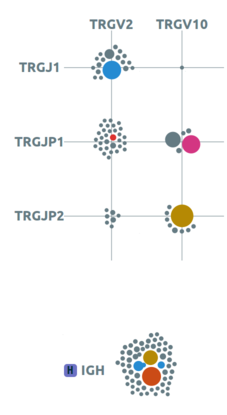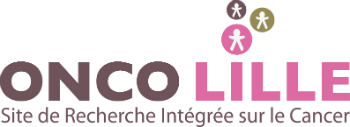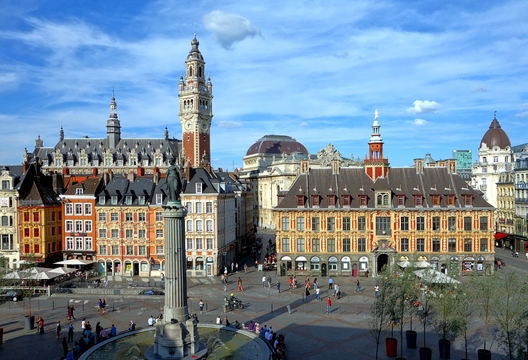V(D)J recombinations in lymphocytes are essential for immunological diversity. They are also useful markers of pathologies, and in leukemia, are used to quantify the minimal residual disease during patient follow-up. High-throughput sequencing (NGS/HTS) now enables the deep sequencing of lymphoid populations. With dedicated Rep-Seq bioinformatics methods and software, clinicians and researchers can now qualify and sometimes quantify the heterogeneity of these lymphoid populations.
This workshop was intended for users and developers of Vidjil, to share experience, protocols and results, to raise questions and decide development priorities, and possibly to set up new collaborations between biologists and bioinformaticians. The workshop included two invited talks, hematology, immunology and bioinformatics talks from the users and developers of Vidjil, and practical hands-on sessions on participant data. The workshop gathered 36 scientists from 6 countries, thank you for your participation! The next Vidjil workshop will take place in March 2019.
Program

The workshop starts on Tuesday 21st at 9:00 and end on Wednesday 22nd at 16:00. The workshop includes invited talks, including one by Thierry Mora, hematology and bioinformatics talks from the users and developers of Vidjil, and practical hands-on sessions on participant data. We expect that one participant from each group will do a short presentation of his research or clinical work, and, if applicable, of the results obtained with Vidjil or with other software.
For the practical sessions, the participants are invited to bring a laptop and some of their NGS data (fasta / fastq / fastq.gz files). The data can also be uploaded into user accounts on app.vidjil.org before the workshop. We also provide public test data for the people who do not currently have their own NGS Rep-Seq data.
Tuesday 21 November
| 8:45 – 9:15 | Registration, coffee |
| 9:15 – 9:30 | Introduction |
| 9:30 – 11:00 |
Algorithmics and bioinformatics
|
| 11:00 – 11:30 | Break |
| 11:30 – 12:45 | Hematology, diagnosis and MRD
|
| 12:45 – 14:30 | Lunch |
| 14:30 – 16:30 | Practical sessions 1 (in parallel)
|
| 16:30 – 17:00 | Coffee Break |
| 17:00 – 18:00 |
Bioinformatics and software development
|
| 20:30 | Dinner, Mezze restaurant
Layalina, in Lille.
Stop at the République – Beaux-Arts metro station. |
Wednesday 22 November
| 9:30 – 10:30 | Keynote talk: Elizabeth Macintyre
Laboratoire d'hématologie biologique, Hôpital Necker, Paris TRD CDR3 immunogenetics – specificities and pitfalls | ||
| 10:30 – 11:00 | Hematology and Immunology
| ||
| 11:00 – 11:30 | Coffee Break | ||
| 11:30 – 12:30 | Keynote talk: Thierry Mora
Laboratoire de Physique Statistique, ENS, Paris Diversity and specificity of immune repertoires The diversity of repertoires of B-cell and T-cell receptors is generated by a stochastic process of gene rearrangement called VDJ recombination, and later shaped by selection, clonal proliferation, and somatic hypermutations. I will show how these processes can be learned quantitatively from high-throughput repertoire sequencing data, and used to estimate the diversity of repertoires, their overlap between individuals, and to identify condition-specific immune receptors from patient data. | ||
| 12:30 – 14:15 | Lunch | ||
| 14:15 – 15:30 | Practical session 2
|
Practical information
Lille is a lovely city at the heart of French Flanders. With TGV, Lille is 1h from Paris, 1h20 min from London and 35 min from Brussels.
List of hotels with available rooms
The workshop takes place at Lilliad, in the heart of the Lille 1 Campus, at 20 minutes from Lille center. Lilliad is the brand new university library, which also hosts scientific events. From Lille center, take the metro line 1 (yellow), direction 4 Cantons. Stop at the Cité Scientifique – Professeur Gabillard station. The Lilliad building is 200 meters from the metro station.
Organizers
The workshop is organized by Aurélien Béliard, Mathieu Giraud, Ryan Herbert, Tatiana Rocher, Mikaël Salson, Florian Thonier, Maximilien Vanleene and Aurélie Wieczorek, from CRIStAL, Inria Lille and SIRIC OncoLille.





